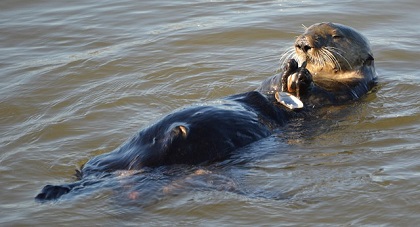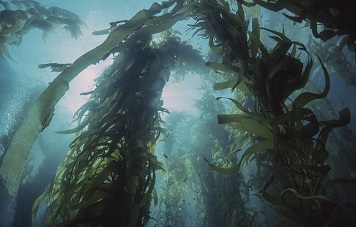News
Stories making wavesOtterly Remarkable!
SEA OTTERS DIET SHAPES CALIFORNIA COASTS


The reintroduction of grey wolves into Yellowstone and their amazing cascading effects on transforming the geology and biodiversity of the park have been well documented. Most notably in this case because of their diet of elk and deer who had been eating saplings alongside the rivers - thus reversing riverbank erosion and altering the water course. Now the recovery of another 'keystone' species in the USA is helping to significantly curb marshland erosion. According to a new study just published in the journal 'Nature', the recovery of sea otter numbers to an estuary near Monterey, California has been helping to slow down its decomposition to natural levels.
Like the wolves and the elks, this is due to the sea otters' diet. They are particularly partial to striped shore crabs, which have been responsible for erosion of the marshes, due their own diet of the roots of marsh grass which hold the banks in place and the burrows they dig there which collapse into the sea when big waves or storms hit.
Hunted to extinction in the 19th century because of their pelts - a mixture of hunting bans and habit restoration saw the first sea otters return in 1984 and numbers in the estuary have also been boosted by the Monterey Bay Aquarium's program for raising and releasing orphaned sea otters.
According to Brian Silliman, a coastal ecologist and co-author of the new study, the marsh banks where just falling into the creeks and desperately needed stabilising but the otters seem to be doing just that. Erosion rates dating back to the 1930s were studied, along with fenced off areas which the otters couldn't reach - but turned out to have eroded faster. "Sea otters are amazing finders and eaters," he said. You can read the full paper HERE.
**OTTERS HELPING THE KELP: Another recent study backing up Brian's claim, and also based in California, shows that Sea Otters help regenerate kelp forests, through their diet! Kelp forests, which purify water, are important habitats for all sorts of ocean wildlife and also serve as a buffer against the waves, helping reduce coastal erosion rates - which is becoming more important as our climate leads to more severe weather. The study showed that otters may increase kelp resilience to climate change when warming temperatures lead to 'sea urchin swarms' (which predate kelp forests) as they munch on the sea urchins and keep the numbers down to enable the kelp to recover. You can read the full study HERE